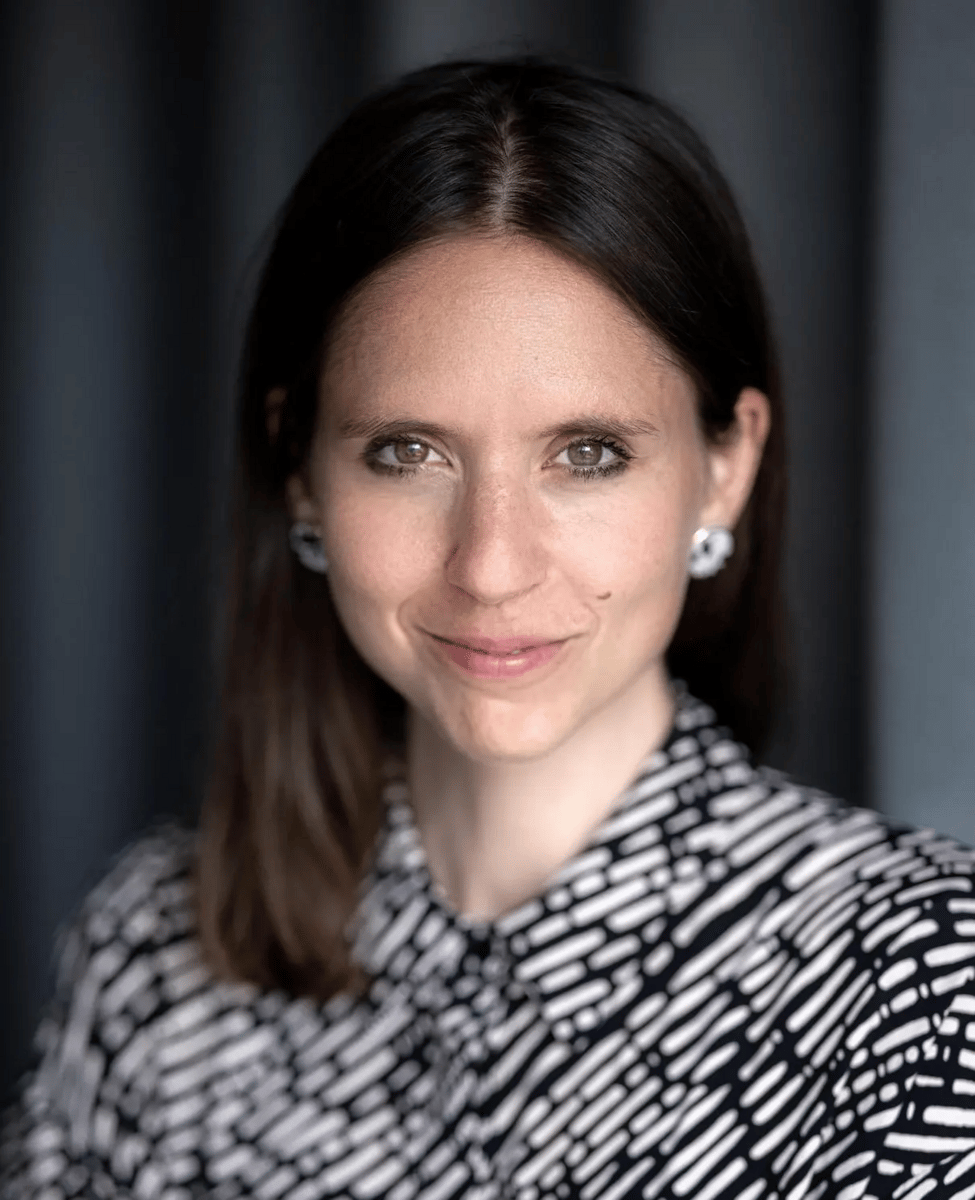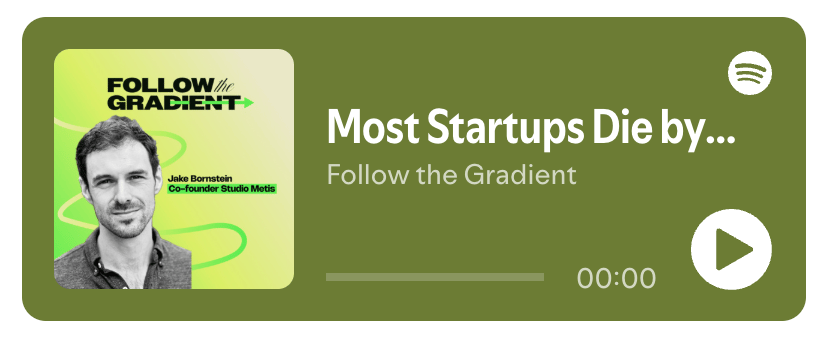Dear hustlers, founders, operators and visionaries,
Every founder eventually runs into themselves. In this episode, we hear from Jake Bornstein, a former hedge fund strategist turned executive coach, who guides startup leaders through the messy middle of growth - where complexity increases, vision blurs, and inner doubts creep in.
From working with unicorns to navigating personal illness and rediscovering purpose, Jake brings a rare blend of strategic clarity and emotional intelligence. This is an episode for anyone who has felt the pressure to “have it all figured out,” yet secretly fears they might be the bottleneck. Exclusively for our newsletter subscribers, Jake has shared additional insights below.
In the meantime: Follow the Gradient and stay tuned!
PS: Has this e-mail been forwarded to you? Sign up here.
How to not run into yourself
What you will get out of this episode
In our conversation, Jake shares:
How to identify the emotional and strategic knots holding your business back and untangle them before they strangle growth
Why most founders sabotage their own companies by avoiding conflict and how to navigate hard conversations with investors, execs, and yourself
How to replace the fantasy of “finding someone who reads your mind” with rigorous clarity and context-setting for your team
Why reconnecting to your original spark can be the antidote to overbuilding, bad mergers, and destructive fundraising decisions
and much more!
Our main take away’s
Clarity beats complexity every time: Whether it’s choosing your core customer segment or resisting shiny distractions, scaling sustainably hinges on being brutally honest about what your business truly does and why it exists. The founders who fail are often the ones who never slow down long enough to define this.
You can’t outsource the hard stuff: Founders frequently swing between abdication and micromanagement, hoping a superstar hire will fix everything. In reality, there’s no substitute for doing the tough inner work: confronting fears of being wrong, rejected, or exposed, and then setting precise direction.
Conflict is not optional; it’s your proving ground: Avoiding hard decisions or uncomfortable conversations may keep the peace in the short term, but it typically breeds chaos later. Great leaders embrace conflict as the stage where clarity and trust are forged.
Emotional work unlocks strategic breakthroughs: Many of the most costly business mistakes; misaligned org structures, misguided raises, or disastrous acquisitions; trace back to unexamined internal drivers like shame, fear, or hidden ambition. Addressing these directly often changes everything.
How to reach out to Jake
Exclusive from Jake
How do you find a great coach? Are there any signals can look out for?
Generally speaking I see coaches fall into 4 broad buckets, and it can be helpful to understand what they are and match them to the main challenge that has you looking for a coach in the first place.
The first is an “inner guide” - primarily focused on helping you productively navigate the stress, fear and other emotions that come up in your seat, with an underlying premise that the main work of a coach is being a partner for reflection and personal transformation. If you feel like you’re struggling through the day-to-day or facing a major existential challenge, but want someone who will have more work context than a therapist, then that may be the place to look. Some good programs based out of the US for this type include Jim Dethmer’s conscious leadership group and Joe Hudson’s Art of Accomplishment - I’m not sure about Europe but they may have suggestions.
The second type is an "accountability partner” mostly about structure / skill acquisition / performance optimization, a bit like a sports coach. If you’re jumping into a new role that has a totally different set of specific requirements, like being a manager for the first time, or generally having a rough time just organizing around the many balls you’re juggling, this type might help. I don’t have any specific suggestions as I’ve spent less time in this particular part of the coaching world, but if you go on a site like BetterUp and poke around you might find someone you like.
The third type is “been there done that” - often ex-founders turned coaches or other experienced business professionals. They may bring elements of the other two styles, but often their biggest value-add is that they can give specific examples from their own experience that can be especially valuable if you don’t have good access to mentors or other founders who can guide you through technically complex areas like IPO readiness or managing a complex board. Check very carefully with this type that they’re humble about their own experience and its applicability to your situation.
Finally, the fourth type is focused above all on what you are creating and how to help you grow into the version of yourself capable of creating it. This is the best type of coach if you’re high ambition and in the steep part of the build curve. This is what I do, and unfortunately does tend to be something that you only really find through word of mouth. I do have a referral list of other firms and individual coaches I like, so even if I’m not the right fit just shoot me an email with a bit about you and I can make an introduction.
In terms of how to find and filter:
If you know other founders, ask them. If there’s a founder you admire but don’t know, shoot them an email, it’s a weird enough question they’ll probably respond. That’s by far the best search mechanism I’ve seen.
If you’re VC backed, ask them. They often have a list of coaches they’ve worked with before.
If you’re stuck Googling or combing LinkedIn, watch out for anyone promising miraculous results. If their marketing content feels gross, trust your gut.
Certifications like ICF offer some kind of quality floor, but many great coaches have no certifications, and many mediocre coaches do.
When you do your intro session, take the risk on bringing the hardest stuff right out of the gates. See how they work with it. A great coach will feel like a 10 / 10 on both support and challenge — you should leave your first session with a sense of being both deeply seen in what you’re facing, and a bit rocked out of your comfort zone.
How do you convince investors that the role of coaching is worth the money?
At this point almost all good private market investors already know it, if they don’t get a coach as soon as you can to figure out how to get better investors in your next raise. If you’re worried about justifying it to your grumpy CFO (or the grumpy CFO that lives inside you), I’d think about it through the following lens:
What’s the size of the goal you’re trying to achieve in monetary terms? (fine if just this year)
What percent of that output do you personally feel responsible for in terms of your judgement and impact?
How much more likely do you think this coach is to help you achieve that goal?
How much confidence do you have that they will do it?
If having run that equation the expected value is less than the cost, then either your goal is too small (so don’t bother), your role isn’t that important (bigger issue), the problems you’re going to work on with your coach aren’t actually that important to how you’ll achieve your goal, or you don’t trust them yet. If the latter two, ask for more time with them until you believe it, or find a coach you do believe in.
Or as a cut-through, “do I think this is going to be more impactful to my business than adding one more junior resource.” If not, probably find a different coach or look at your relationship to receiving help.
If you just had to recommend one framework that had a huge impact on founders you coach, what would it be?
For inner struggles, parts work. There are different parts inside you. They want different things. When you don’t attend to them they show up and sabotage things from the shadows. It becomes a lot easier to figure out what’s going on when you hear from them.
For interpersonal challenges, radical responsibility and getting out of “bad / stupid / lazy” narratives. Why would another person with reasonable intentions be responding this way? What might be important to them? How might they be interpreting the same facts (or how might they be operating off of a different fact set from you)? What might you be doing that’s creating these outcomes?
For basic company structuring (that’s actually the right fit for your context rather than a copy-paste job), minimum viable structure
For greater agency and clearer decision making, a three part visualization of intent - form - do. Article forthcoming - subscribe here.
What is success for you?
Seeing the people I work with building things they love, with people they love, for people they love
What’s one advice, founders should actually ignore?
Any advice that starts with “all successful founders…”
There’s no playbook. I’m sorry. It would be so much easier if there was. Anyone who says there’s a playbook or a basic heuristic by which you can make your decisions is naive or selling you something. If you look at the history of most truly great founders and companies most people thought they were insane, at least for their most important decisions.
The one that’s been making the rounds recently that I’ve seen be particularly destructive - “you just have to hire great people and get out of the way”
What is success for you? What are habits, activities or rituals that keep you sane (while scaling your business)?
Treating the basics as essentials. Sleep. Real food. Move my body. Make space for silence daily. Enjoy how grateful I am for being alive. Everything else starts there.
What is one “growth hack” (be it business, health or personal-wise) that has a positive impact on you or the company?
Let go of the idea that you’ll ever be able to manage what other people think about you or feel, and just start saying what’s true.
Caveat - this starts with learning what true things actually feel like.

Follow the Gradient is a weekly newsletter and podcast by the serial founders Melanie Gabriel & Christian Woese about how to build a business in Europe while staying sane.










